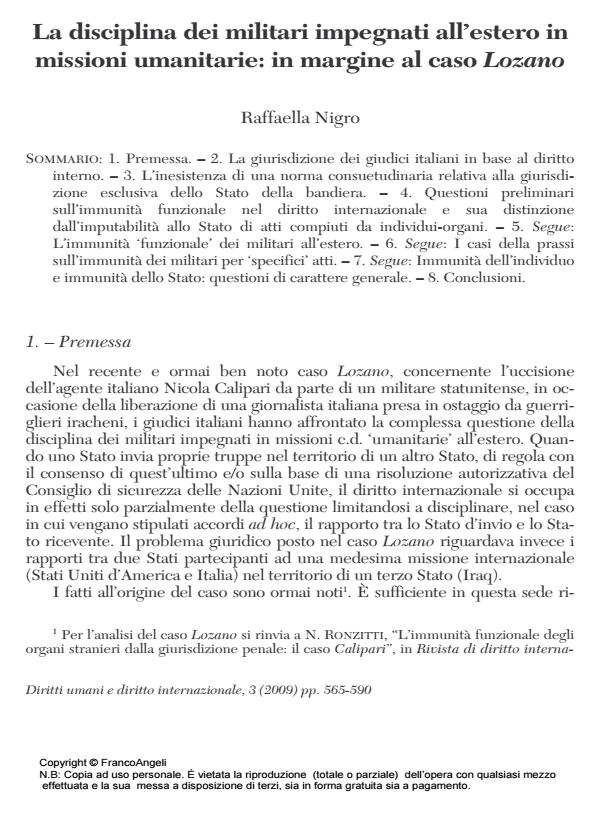La disciplina dei militari impegnati all’estero in missioni umanitarie: in margine al caso Lozano
Journal title DIRITTI UMANI E DIRITTO INTERNAZIONALE
Author/s Raffaella Nigro
Publishing Year 2009 Issue 2009/3
Language Italian Pages 26 P. 565-590 File size 393 KB
DOI 10.3280/DUDI2009-003007
DOI is like a bar code for intellectual property: to have more infomation
click here
Below, you can see the article first page
If you want to buy this article in PDF format, you can do it, following the instructions to buy download credits

FrancoAngeli is member of Publishers International Linking Association, Inc (PILA), a not-for-profit association which run the CrossRef service enabling links to and from online scholarly content.
Armed Forces engaged in humanitarian missions abroad: the Lozano case - In the well-known Lozano case, an Italian intelligence agent, Mr Nicola Calipari, remained killed in 2005 by an American soldier, Mr Mario Luis Lozano, while entering a US checkpoint on the way to the Baghdad airport soon after securing the release of an Italian journalist from Iraqi kidnappers. In the ensuing case, Italian courts addressed a number of sensitive questions, including that of jurisdiction over national troops involved, directly or indirectly, in so-called "humanitarian missions" abroad. Italian courts did have jurisdiction over the killing under Italian domestic law. Indeed, the murder of Mr Calipari can be regarded as a "political crime" under Article 8 of the Italian penal code. On such a premise, the question is whether Article 8 was superseded by a customary international law rule under Article 10 of the Italian Constitution aimed at excluding jurisdiction over Mr Lozano. State practice suggests that neither a customary rule on the exclusive jurisdiction of the sending State (as claimed by the Court of Assise of Rome in 2007) nor a customary rule on Mr Lozano’s functional immunity (as claimed by the Court of Cassation in 2008) are established in customary international law. Rather, State practice reveals that a number of States are likely to recognize immunity from jurisdiction to the armed forces only in certain specific circumstances. Moreover, such immunity is quite different from the functional immunity traditionally enjoyed by diplomatic and consular agents, as well as from the immunities enjoyed by other high-ranking State officials, such as the Head of State, the Head of Government and the Minister for Foreign Affairs.
Raffaella Nigro, La disciplina dei militari impegnati all’estero in missioni umanitarie: in margine al caso Lozano in "DIRITTI UMANI E DIRITTO INTERNAZIONALE" 3/2009, pp 565-590, DOI: 10.3280/DUDI2009-003007